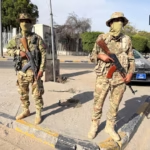The Minister of Defence and Veteran Affairs, Hon. Jacob Oboth Oboth, is set to table the Uganda Peoples’ Defence Forces (Amendment) Bill, 2025 before Parliament. The sweeping 143-page Bill, comprising 84 clauses, seeks to overhaul the Uganda Peoples’ Defence Forces (UPDF) Act, Cap. 330.
Among its key reforms, the Bill aims to realign Uganda’s military justice system with a 2021 Supreme Court ruling that found the trial of civilians in military courts unconstitutional—except under “exceptional circumstances.” However, legal experts and human rights activists warn that the proposed amendments may dilute the spirit of that landmark judgment.
In the case of Attorney General vs Hon. Michael Kabaziguruka (2021), the Supreme Court ruled that military courts are not competent to try civilians, except under rare, legally-defined situations. The Court emphasized the constitutional right to a fair hearing before an independent and impartial tribunal, as provided in Article 28 of the Constitution.
The ruling led to a shift in the prosecution of several high-profile individuals. For instance, opposition leader Dr. Kizza Besigye and his aide Obeid Kamulegeya—both previously charged in military courts—had their cases transferred to civilian courts.
The most contentious part of the proposed Bill is Clause 30, which introduces Section 117A, outlining categories of civilians who may fall under military jurisdiction. These include:
- Individuals accompanying military units on active duty—potentially including spouses, children, and other dependents.
- Contractors or persons “engaged” by the military, though the term “engaged” lacks clear legal definition.
- Civilians in unlawful possession of military-only equipment, including AK-47s, pistols, and dual-use chemicals like ammonium nitrate.
- Those who aid or abet soldiers in crimes such as treason, murder, or aggravated robbery.
- Persons found with UPDF uniforms or classified military stores.
- Individuals serving in foreign armed forces.
Although the Bill retains the term “exceptional circumstances,” critics argue that it fails to define what qualifies as such—leaving the door open to subjective interpretation by military authorities.
Human rights lawyer Nicholas Opiyo has voiced strong opposition to the Bill, stating that it “restates what was in the old law and imports military regulations into the Act.”
He warned:
“This does not seem like compliance by any stretch of imagination, rather a clever attempt at disguising its disregard of the Supreme Court directives.”
Opiyo further questioned whether scenarios like aiding a soldier in a crime or wearing a military uniform should truly qualify as “exceptional circumstances,” noting:
“Save for military equipment, the rest seems pretty ordinary.”
Beyond the civilian jurisdiction issues, the Bill proposes sweeping institutional and structural reforms, including:
- Establishment of a Military Courts Department and a disciplinary unit within the Defence Forces.
- Defined jurisdiction and appeal structures for court martial decisions.
- Expansion of UPDF services to include the Special Forces Command and the Reserve Force.
- Repeal of the Uganda Veterans Assistance Board Act.
- Introduction of new healthcare, pension, and compensation frameworks for officers and militants.
With the tabling of the Bill imminent, Parliament faces mounting pressure from civil society and constitutional experts to ensure that any reforms align with constitutional guarantees and the Supreme Court’s interpretation of civilian rights.
While the Ministry of Defence maintains that the Bill modernizes the UPDF legal framework in line with constitutional principles, critics insist that more explicit safeguards are needed to protect civilian legal rights from military overreach.



